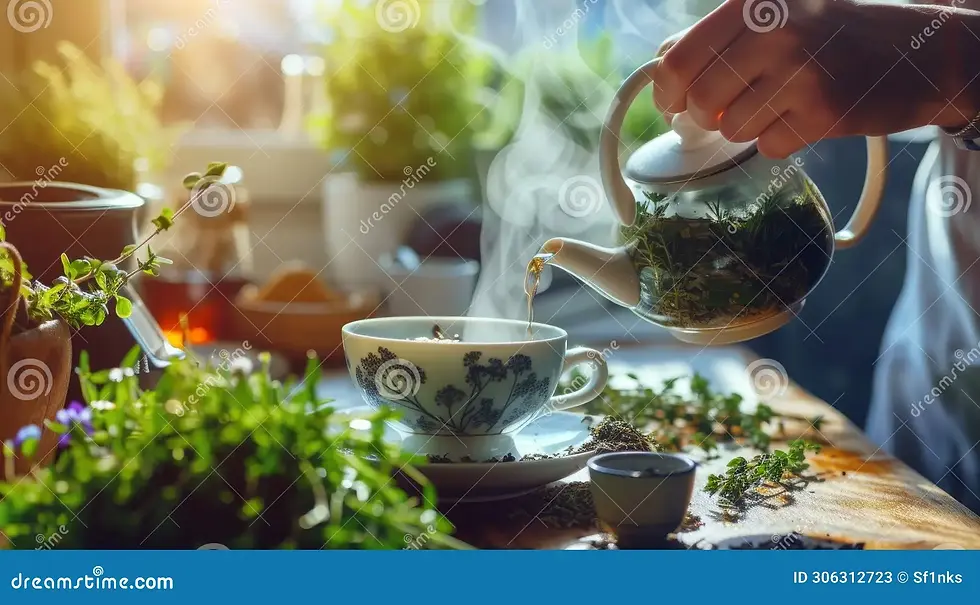What is the immunity and how to boost it with Chinese Medicine?
- Jenny Swan
- Nov 16, 2024
- 4 min read

Wei qi
In Traditional Chinese Medicine (TCM), Wei Qi translates as defensive Qi or the immune system. The lungs and Wei Qi are both said to control the body’s surface. The diffusing function of the lungs assists the spread of Wei Qi. But while the lungs may help to spread it, the true genesis of Wei Qi lies in the middle burner (the digestion).
The lungs are responsible for the skin and the process of breathing. When the lungs’ energy is balanced, Wei Qi is strong, and the immune system can fight any external pathogens. When the lungs’ energy is out of balance, the body is more open to the attack of pathogens such as bacteria,viruses and even fungi. Symptoms of unbalanced lung energy or weak Wei Qi include fever, chills, headaches, sore throat, runny nose, coughing.
What damages Wei Qi?
Poor food choices (sugars, processed foods, GMO, fast foods, unhealthy snacks, processed meats, sugary drinks, alcohol);
Drugs, toxic substances and smoking;
Sedentary lifestyle;
Poor sleep patterns lead to mental confusion and lack of focus;
Chronic or acute illnesses, immobility;
Emotional stress such as fear, anger, irritability, anxiety, depression, grief, worry, guilt, blame, arrogance;
Low self-esteem and lack of confidence;
Inadequate home environment and contact with negative people;
Environmental factors such high pollution areas, excessive exposure to cold, wind, and heat.
In TCM, the body is seen as a microsystem where each organ has its function and role. For example:
The lungs are the storehouse of fluid for the body;
The liver regulates the Qi activities;
The heart manage the blood and commands the mental activity;
The kidneys store the essence (jing) and dominate the reproduction and development;
The stomach digests the foods and drinks, emotions, thoughts, nurturing the spirit;
The spleen is in charge of digestion, blood coagulation and fluid metabolism;
What happens when a pathogen enters the body?
When a pathogen enters the body, the body temperature increases, Wei Qi is Yang (warm, energetic) in nature. Defensive Qi works mainly around the skin and muscles and includes fever, chills, and shivering responses. The stronger one’s immune system, the higher the fever and the worse symptoms. The defence mechanism helps the body into homeostasis (the process by which living organisms maintain a stable internal environment despite changes in external conditions). Sweating during a fever is seen in TCM as the body’s way of expelling the pathogen, with the pores letting the pathogen out. This is why TCM doctors will encourage a fever rather than suppress it (which Paracetamol will do). When the Wei Qi is weak our bodies are more open to an attack from the various pathogens. So how do we strengthen Wei Qi so that we can withstand a pathogenic attack?
Exercise
Exercise to the point of sweat daily can help to expel pathogens from entering the body via barriers such as the skin. The balance between Yin activities (Qigong, Yin Yoga, Meditation and breathing practices) and Yang activities (Shaolin, aerobic exercises, running, swimming, fast walking) is ideal.
Proper Sleeping Routine:
Sleep is a rejuvenation time for the liver to replenish and cleanse the blood, build strong immunity, dream, rest, and restore. At least 8 hours per night is essential for preventing disease.
Cleansing Regimen:
Autumn is the season for organizing and letting go, an ideal time for cleansing the body of junk and negative emotions as well as perhaps paying attention to the environment around us and clearing out any accumulated clutter.
Proper Nutrition:
Add to the diet foods that help Wei Qi to get rid of pathogens such as chestnuts, raw onions, Asian pears, apples, garlic, ginger, cardamom, cinnamon, clove, nutmeg, mint, mushrooms, parsnips, green onion, congee rice, banana, almond, white sesame, and broccoli.
Chinese Herbs:
Any herb or herbal combination that boosts or enhances the immune system will keep the body functioning at its optimal level. Astragalus (Huang Qi) is used to tonify the Wei Qi, fortify the lungs, protect against pathogens, and increase the white blood cell count. In addition to tonifying (strengthening) the protective Qi, Astragalus benefits digestion and reduces inflammation. Its gentle upward action lightens the body and limbs and helps us feel more energetic and less fatigued. It also lifts the mind, improving focus and memory. Astragalus achieves all of this while being antihypertensive, hematopoietic, hepatoprotective, metabolic, anti-ageing, and much more.
There is a famous Chinese herbal Formula named "Yu Ping Feng San" or Jadescreen Windscreen Powder which is said to strengthen the Wei Qi whilst strengthening the body against pathogenic invasion. Chinese herbalists used this formula to great effect during Covid to prevent infection. The herbs in this Formula are Huang Qi, Bai Zhu (Atractylodis Rhyzome) and Fang Feng (Saphoshnikoviae Radix).
There is also an interesting fungus called Cordyceps (Dong Chong Xia Cao) which is used to enhance the immunity by increasing white blood cells, T-cells and interferon, inhibiting the growth of cancer cells.
Acupuncture
Helps strengthen immunity by dispersing the lung Qi and clearing pathogens before they go deeper into the body. In addition, it enhances the circulation of energy and blood. Regular acupuncture treatments can lead to an increase of T-cells in the body. T-cells are responsible for destroying pathogens. Acupuncture induces the body’s immune response by sending T-cells and white cells to the acupuncture sites to fight off the pathogens. The effects of acupuncture can last for several days, which keeps immunity higher than normal. Acupoint combinations for tonifying Wei Qi almost always include needles or moxa on ST 36 (a typical formula is ST 36, LI 4, UB 12 and UB 13).



